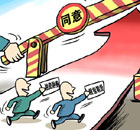-
-
China Daily E-paper
Highlights
Internet should be free but regulated
(China Daily)
Updated: 2010-01-26 07:50
 |
Large Medium Small |
US Secretary of State Hillary Clinton delivered a speech on Internet freedom recently in which she covertly criticized China's policy toward online users. It's true that the Net is free. But freedom does not mean we should not have regulations, says an article in Beijing News. Excerpts:
In a recent speech on Internet freedom, US Secretarty of State Hillary Clinton urged China to investigate the reported attacks on Google, implying that the Chinese government's Internet policy had deficiencies. The Foreign Ministry responded by stating its opposition to Clinton's move.
| ||||
In fact, the Net has always been open in China. Some examples from last year will prove the point: Several incidents, including corruption and efforts to seek social justice were exposed or highlighted by netizens, reflecting the strength of the Net. Countering corruption online is the in thing in China. The authorities recognize it as such, too, and accept it as an effective way of fighting corruption.
But just like in the real world, there is no absolute freedom on the Internet. Laws are necessary to keep the virtual world in order, too. Every country has its own laws to regulate the Net and combat illegal actions, and the US is no exception. Nor should be China.
China has been a victim of hackers. Many of its people and enterprises have been subjected to cyber attacks. The National People's Congress has implemented laws precisely to prevent such violations on the Net. And Google, as a company doing in China, has to obey the Chinese laws.
In this age of globalization, free flow of information is precious, but not without obeying laws.
As a double-edged sword, the Internet can be employed for good and evil both. Therefore, online users should be protected by law.
In one word, the Internet is both free and regulated. The question of Internet freedom in any country is connected with local customs and cultural traditions, and should not be politicized.
(China Daily 01/26/2010 page9)












